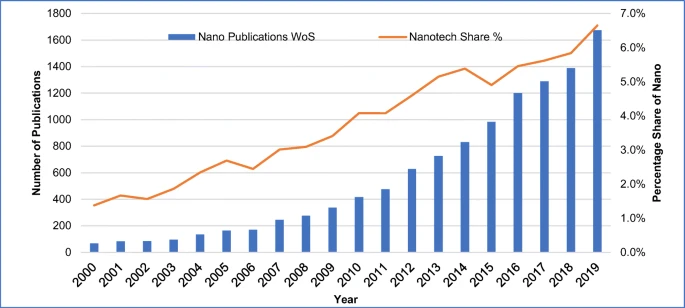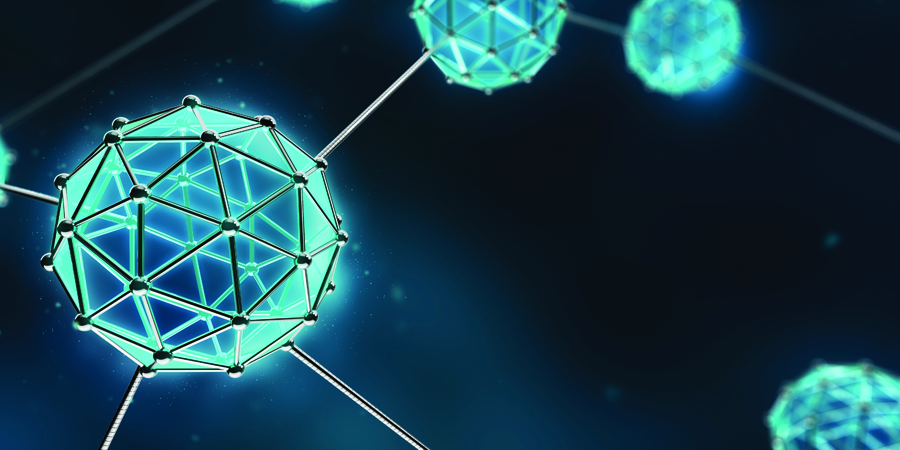Innovating in science creates value by developing new products and services, solving social problems, creating new enterprises, and generating employment opportunities. Nanotechnology is one example. This technology deals with the study of ultra-small objects and is applicable to all scientific fields, such as chemistry, biology, physics, materials science, engineering.
While South Africa, Egypt, and Nigeria are all making progress in nanotechnology research and applications, much work remains to be done in the African continent.
Nanotechnology publications are on the rise
Based on a 20-year period of scientometric analysis on the Web of Science (WoS), this figure shows South Africa's nanotechnology publication trend between 2000 and 2019 that reflects how nanotechnology research publications grew at a faster rate than in other areas. Publications increased by 2458% from 68 in 2000 to 1672 in 2019 On the other hand, the country's total publications increased from 4950 in 2000 to 25,163 in 2019, thus registering a rise of 508%. Thus,

Source: Web of Science
The advancement of nanotechnology has a wide range of socio-economic benefits and significantly contributes to humanity achieving the Sustainable Development Goals (SDGs). Among the solutions made possible by nanotechnology are affordable clean water, efficient solar cells for renewable energy, and medical solutions, such as nano-assisted face masks that destroy COVID-19 pathogens.
Moreover, the implementation of national nanotechnology initiatives has enabled many governments to utilize nanotechnology to their advantage. Many countries have implemented national nanotech strategies, including the United States (USA), United Kingdom (UK), Japan, India, South Korea, Germany, and South Africa, among others.
Pros and cons of nanotechnology
Nanotechnology is one of the most exciting innovations nowadays. Combined with all the suggested aspects, these micro-machines can change several industries at the same time. Despite its many benefits, nanotechnology also has some disadvantages that must be carefully evaluated. Here is a look at the key points of nanotechnology’s pros.
-
Changes on the cellular level
Nanotechnology has the potential of restructuring items at a cellular level. As an example, imagine turning organic cells instantly into consumable food and trash could be turned into usable goods. It would be possible to alter one thing in many ways and thus use fewer items, making recycling a whole new meaning.
-
Extending human life
Since cells can be altered at their core level, there are many ways to extend human life. There is the potential to cure difficult diseases such as cancer and ALS, as well as to slow down or possibly even stop the aging process. It is possible to manipulate organic materials to create or repair damaged organs or even replace amputated limbs.
- Creating self-repairing technology
The nanotechnology innovation could be used to virtually self-repair anything. For instance, once the malfunction is detected in an airplane that has a malfunction in its hydraulics system, the nanotechnology could be used to fix the problem so the aircraft and its passengers can be saved.
- Alleviating poverty
Nanotech is important because not only it could create many high paying new jobs, but in the case of severe lacks or wars, people could manipulate matter to create food and water, children born with addictions and diseases could be cured, and it has the potential to allow everyone equal access to many opportunities.
Whereas some of the cons of nanotech are:
- Weaponized
If cellular repair is possible, then so can cellular destruction. Nanotechnology's limit lies with its programmer. It is possible that nanotechnology could be weaponized to create delivery systems that could dispose of a population while leaving its infrastructure intact. If nanotech countermeasures aren't in place, the technology could even self-replicate, making it difficult to defeat.
- Making current energy technologies obsolete
Numerous sectors of industries are built on fossil fuels. Nanotech could make these technologies obsolete. The resulting change in economic circumstances would shift where the value is seen in a population base.
- Creating new diseases
There is no guarantee that the problems nanotech could solve, wouldn't just generate new problems without solutions in the future that would be even worse; A nanoparticle in the lab is one thing, but a nanoparticle interacting with blood, cells and tissues is another, and the behavior of particles can change considerably when moving from one environment to another.
- Creating a new system of class identity
Nanotechnology may ultimately provide low-cost food options, but there is always the possibility that one nation or group will hoard this technology. One socioeconomic class could keep the technology for their own benefit, creating a new system of haves and have nots.
The nanotechnology pros and cons show a lot of exciting potentials, coming at a certain risk. We must weigh these pros and cons carefully to determine our next steps in this exciting STEM field of research. Nanotechnology has become the core for the convergence of several disciplines. Only our imagination could limit the effectiveness of this technology.
